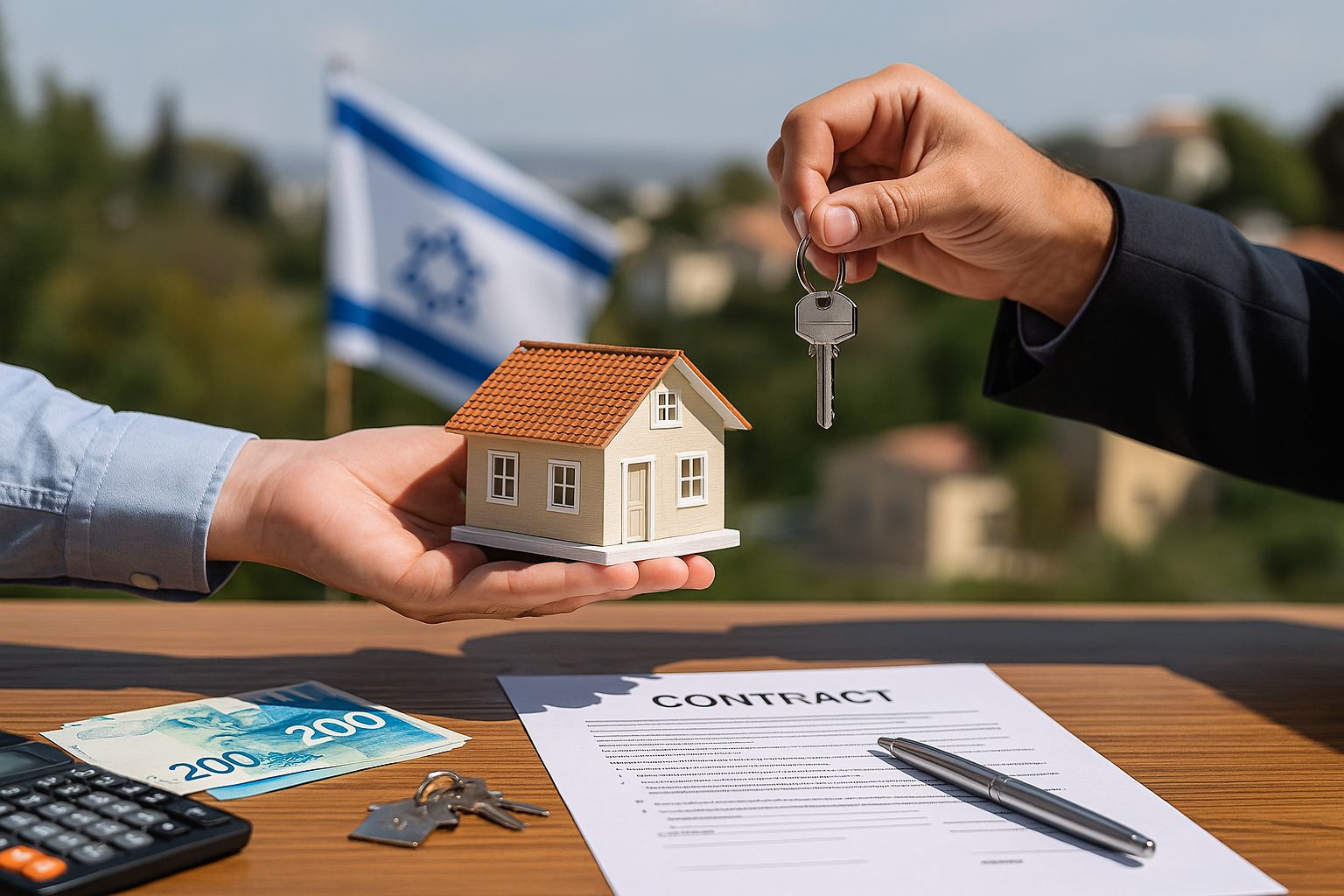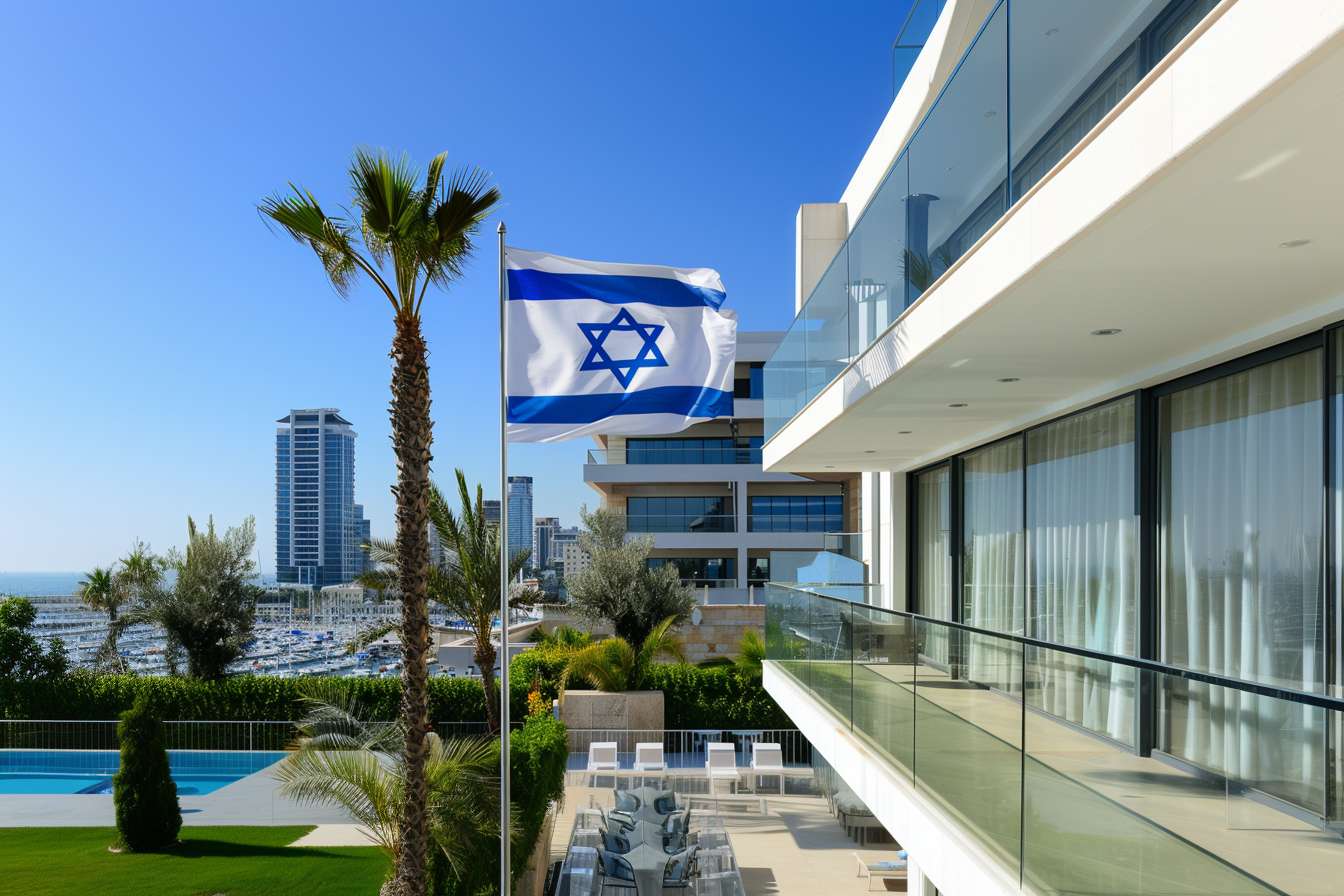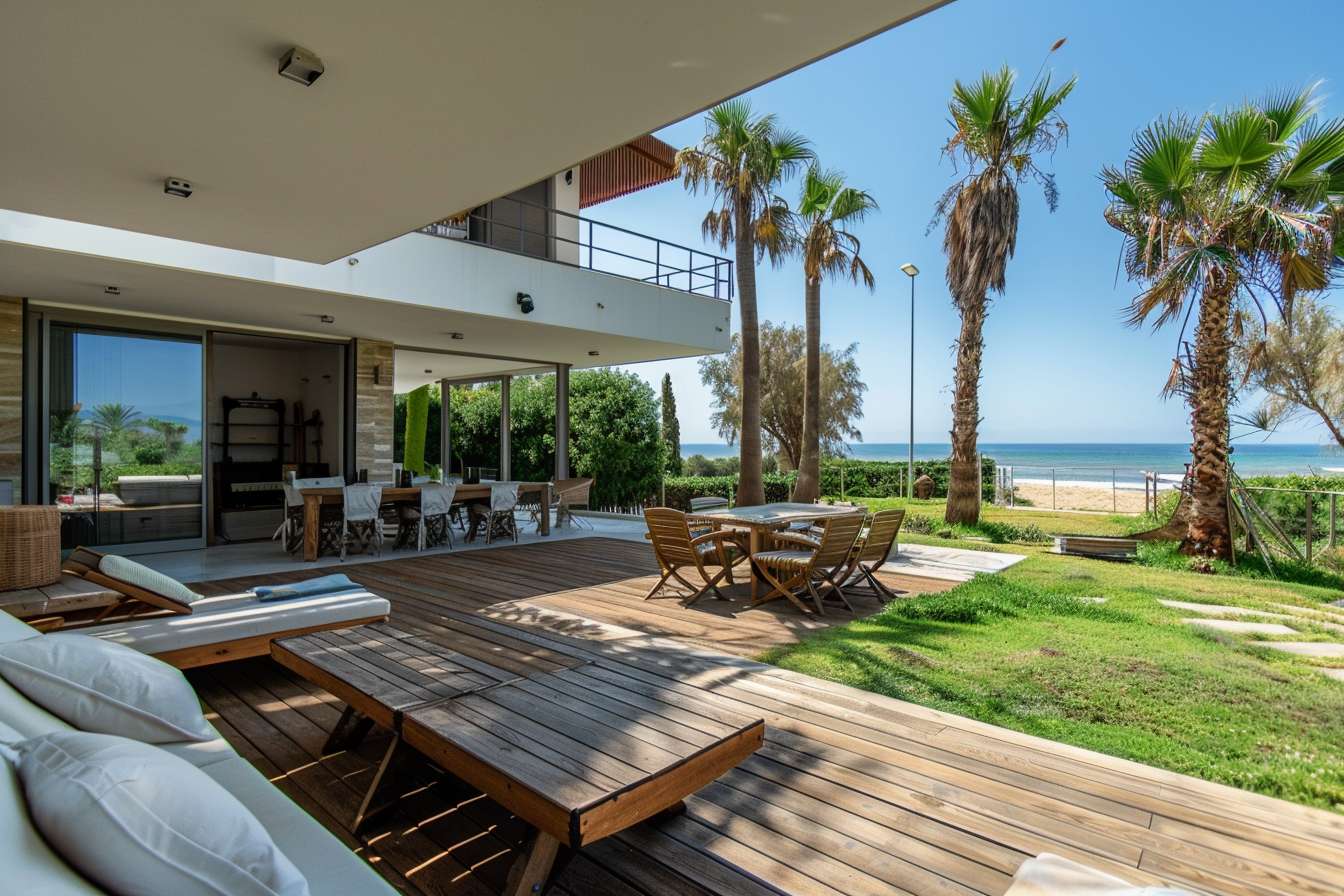In this Guide:
Thinking about how to buy property in Israel? Whether you're an oleh, investor, or dreaming of a pied-à-terre in Tel Aviv, navigating the system can feel overwhelming. Don’t worry—we’ve helped countless newcomers through it. This guide breaks it down simply, step-by-step, with real tips, examples, and insider know-how.
Key Takeaways:
- Yes, foreigners can buy property in Israel — but you must understand the land ownership system (state vs private), and you’ll need expert legal guidance.
- The 10-step purchase process in Israel includes legal reviews, mortgage approvals, contracts, and title registration — it’s different from many countries.
- Costs go beyond the price tag — expect taxes (Mas Rechisha), legal fees, and agent commissions. Budget at least 8–10% extra.
- New olim and expats face unique challenges like financing hurdles, language barriers, and extra paperwork — but you’ve got resources to help you.
What is the process for buying property in Israel?
So, you’ve got your eye on a cozy apartment in Jerusalem or a beach-view flat in Herzliya? Welcome to the uniquely Israeli real estate jungle!
The Main Players in the Process:
- You (the buyer) – Obviously.
- Seller – May or may not be in a rush.
- Real estate agent – Often shows you places that are almost what you want.
- Real estate lawyer – Absolutely essential.
- Bank – For that all-important mortgage (aka Mashkanta).
- Notary & government registries – To make it all official.
The Typical Workflow:
- Search: You’ll view 5,000 listings. Then fall in love with the first one you saw.
- Negotiate: Haggle like it’s Shuk HaCarmel.
- Sign contracts: Nothing is binding until ink is dry.
- Secure mortgage: Get your “Ishur Ekroni” (pre-approval).
- Register the title with Tabu or Minhal.
- Pay taxes and fees.
- Get the keys – and check the taps work.
How It’s Different from Other Countries:
- Verbal agreements mean nothing. It’s not a deal until you sign.
- You’ll need a lawyer for everything – even something as “small” as buying an apartment.
- Most land is state-owned, not privately owned (more on that next).
One oleh told us he agreed to buy a place, shook hands, and even popped champagne—only for the seller to ghost him for 2 weeks. Lesson learned: no paperwork = no party.
Need help finding a pro? Check out how to choose a real estate agent and lawyer in Israel.
Why is understanding Israeli real estate law important before buying?
Let’s be real—Israeli real estate law is like hummus: simple on the surface, but layered and complex once you dig in.
What Makes It So Tricky?
- Different land ownership types:
- State land (administered by the Israel Land Authority)
- Private land (rare, but gold)
- Leasehold land (usually 49 or 98-year leases)
- Zoning laws can be a surprise. That charming rooftop patio? Might not be legal.
- Permitted uses: You can’t just open a café in your front yard (unless you like fines).
- Legal risk: Unregistered rights, unpaid taxes, old tenants who never left—fun!
We once had a couple excitedly ready to move into their dream home—only to learn a relative of the seller still had a legal right to live there. Surprise!
What You Can Do:
- Hire a real estate attorney before you make an offer.
- Always do a title check on Tabu or Minhal.
- Ask if the apartment has building permits for everything (even balconies).
For a deeper dive into legal ownership, check out our guide to buying land in Israel.
What are the steps to purchase an apartment in Israel?
We’ve helped dozens of olim through this, and honestly? It’s a wild ride. But with this roadmap, you’ll know what to expect—and what NOT to forget.
1. Identifying, Choosing and Evaluating the Apartment
Start by locking down your budget. Don’t forget to factor in:
- Taxes (Mas Rechisha)
- Legal fees
- Agent commission
Neighborhood vibes matter. Want something family-friendly and affordable? You might prefer Kiryat Yam over Tel Aviv. Need English-speaking? Look at Herzliya — here's a guide to Herzliya real estate.
Tips:
- New builds offer warranties, but come with long waits.
- Older places? Check plumbing and electrical—some still have fuses from the 80s.
2. Negotiation
Yes, you CAN negotiate. Here’s how:
- Get comps (comparable properties) from sites like Madlan or Yad2.
- Never seem too eager. Israelis smell desperation.
- Be ready to walk. It’s your best leverage.
Funny story? One oleh offered full price... the seller RAISED it mid-negotiation. Welcome to Israel.
3. Zichron Devarim (Reservation Agreement)
Think of it as a “handshake on paper.” It’s not legally binding but shows intent. Used when:
- You need time to finalize financing
- You want to hold the property
Cons? If the seller finds a better buyer, they can walk.
Tip: Never sign without your lawyer reviewing it.
4. Financing the Deal
You’ll need a Mashkanta (mortgage). Israeli banks require:
- 30–40% down payment for foreigners
- Proof of income (even from abroad)
- Good credit or collateral
Start by getting an Ishur Ekroni (pre-approval). You can find full details in our mortgage guide for Israel.
5. Signing a Contract with the Seller
So, you’ve agreed on the price—amazing! Now the real fun begins: the contract phase. This step is absolutely critical and often underestimated.
Once the seller sends the contract to your lawyer, you usually get a 2-week exclusivity period to sign. That means the property is temporarily "yours" and can’t be offered to someone else. It's your gazumping shield—but the clock is ticking.
Within those two weeks, you’ll need to:
- Thoroughly review the contract (in Hebrew, usually hundreds of pages)
- Sign 4 hard copies (yes, in-person, with blue pen… Israel loves paper)
- Transfer your 20% deposit to the seller
One oleh told us he was overwhelmed by the sheer paperwork—so he used Google Translate on each clause before signing. Not ideal, but better than signing blind.
Contract Key Elements to Watch For:
- Penalty Clause: Typically 10% of the property price if you breach the contract. No joke.
- Payment Schedule: A standard split might look like this:
- 20% on signing
- 30% one month later
- 30% the month after that
- Final 20% upon registration
But—these can be negotiated. Some sellers love fast cash, so if you offer bigger payments upfront, they might knock something off the price. It’s all part of the dance.
- Mortgage Approval: Don’t sign anything without your Mashkanta pre-approval. Seriously.
- Grace Period: This is your financial breathing room between signing and payment deadlines. Standard is 7 days, but push for 30 days—especially if you're juggling funds or bank delays.
Bonus? One lucky oleh negotiated full property access after signing, even before final payment. He got a jumpstart on renovations and saved months.
Tip: Contracts in Israel are strict. Once signed, there’s no “cooling-off” period. Make sure every clause reflects exactly what you agreed. When in doubt? Push back, or walk away.
Once signed your lawyer should:
- Add a HeArat Azhara (cautionary note) to block others from buying it
- Review every clause—especially about payment terms, defects, and penalties
Never use a seller’s lawyer. You need your own.
6. Finalizing the Loan – Mashkanta
Once you’ve signed the contract, it’s go-time for the mortgage.
Even if you already got pre-approval (Ishur Ekroni), the bank still needs:
- The signed contract
- Proof of down payment
- Legal documents reviewed by their in-house attorney
- Appraisal (some banks send someone to inspect the property)
Expect 2–3 weeks for the final approval and loan issuance. It’s not uncommon for banks to request last-minute documents, so have your email alerts ON.
Tip: Some olim reported delays because their pay stubs weren’t translated properly. If you're earning abroad, get your financials professionally translated.
7. Registration (Title Transfer / Tabu/Minhal)
This is when you legally become the owner. Your lawyer handles this part, registering your ownership in one of three registries:
- Tabu (most common)
- Minhal Mekarkei Yisrael (Israel Land Authority)
- Church registry (some Jerusalem properties)
Before registration:
- Make sure the HeArat Azhara (warning note) was placed at signing.
- Remove any old debts or legal claims on the property.
- Pay the final balance.
Tip: Don’t assume it’s done—ask your lawyer for confirmation and a copy of the updated title.
8. Tax Payment & Fees
You’ll be dealing with a pile of post-sale expenses. Let’s break them down:
- Mas Rechisha (Purchase Tax): Sliding scale from 0% to 10%. Olim may qualify for discounts. Check eligibility here.
- Arnona (City Tax): Paid annually or monthly. Check rates with the local municipality.
- Va’ad Bayit (Building Fees): Monthly, for building maintenance.
- Outstanding Debts: These follow the property, not the owner—check carefully!
Tip: Ask your lawyer to run a full debt and lien check before transfer. One buyer had to pay back-dated water bills... for a year they didn’t even live there.
9. Move In, Inspection & Warranty Rights
Congrats—you’ve got keys in hand! But don’t kick back just yet.
Here’s what to check before moving in:
- Water pressure (yes, really!)
- AC/heating systems
- Electric outlets
- Cracks, leaks, or mold
In new construction, the builder must fix defects under the Takam Tikunim (Repair Period). You’ll usually get:
- 1–7 years warranty, depending on the issue
- Coverage for major structural faults, leaks, etc.
Tip: Do a walk-through with an engineer or qualified inspector before move-in. One oleh skipped this and found their “dream” kitchen was missing plumbing for a dishwasher.
Real story: A family moved in and found no hot water. The heater was broken—but since they didn’t flag it during inspection, it wasn’t covered. Ouch.
Make a snag list and send it to the developer or seller in writing immediately.
10. What Happens Next?
You’re now officially a homeowner in Israel!
Next steps:
- Update Arnona records in your name at the municipality
- Switch utilities: water, electricity, internet
- Register for Va’ad Bayit billing
- Consider insurance (building + contents)
Bonus: Some olim qualify for municipal tax discounts—especially new immigrants or families. Check out our guide to cost of living to see where you can save.
Final tip? Take a breath. Then invite your friends over for some homemade shakshuka and a toast to your new home.
Need help with utilities, translation, or post-move bureaucracy? Talk to us—we've got a full list of services to make settling in smoother.
What financing and mortgage options are available in Israel?
Mortgages in Israel aren't one-size-fits-all, and foreign buyers have extra hoops to jump through.
What Banks Expect:
- Down payments of 30–50% (vs. 25% for citizens)
- Proof of legal income from your home country
- Translators for documents not in Hebrew
You’ll need to open a local bank account, submit a credit report, and in some cases, even fly in for a signature. Sound intense? It is. But doable.
Ishur Ekroni is your holy grail: a bank pre-approval letter that shows how much they’ll lend you.
Tip: Shop around—different banks offer different deals, and some are friendlier to olim than others. Check out our guide to investing in Israeli real estate for more on bank comparisons and lending types.
What taxes, fees, and costs apply when buying property?
Ah, the extras no one tells you about—until you’re in too deep.
Here’s What You’ll Pay:
- Mas Rechisha (Acquisition Tax): 0%–10% depending on price, status (first home? foreign buyer?)
- VAT (Ma’am): Only on new builds
- Arnona: City tax based on apartment size/location
- Va’ad Bayit: Monthly building fees
- Legal Fees: ~1% of the purchase price
- Agent’s Commission: 1% + VAT
Real talk? Budget an extra 8–10% on top of the purchase price.
Example: One couple moved from NYC thinking they’d scored a bargain… until they got hit with $50,000 in surprise taxes and fees. Ouch.
Want to compare living costs? Here’s a breakdown of the average salary in Israel to help you plan better.
What are the benefits and challenges of buying property in Israel?
Let’s break it down—because owning in Israel is a dream, but not always a smooth one.
Benefits:
- Long-term appreciation: Property values in Israel, especially in cities like Jerusalem and Tel Aviv, have historically gone up.
- Rental income potential
- Legal protections: Once registered, your rights are strong.
- Mortgage leverage: Use bank financing to stretch your shekels.
- Residency perks: Ownership can help with Aliyah and long-term stays. Read more on Aliyah benefits here.
Challenges:
- High entry costs: Especially for foreigners without benefits.
- Complicated regulation: Hebrew contracts, dense bureaucracy.
- Foreign buyer limits: Not all land is open to non-citizens.
- Currency risk: USD vs. shekel fluctuations can bite.
Still in? You’re not alone—and we’ve helped many olim push through.
What legal and due diligence checks must be done?
You wouldn’t buy a car without checking the engine—same logic applies here.
Legal Must-Checks:
- Tabu, Minhal or Church registry: Confirm ownership. A must!
- Liens or debts: If the seller owes money, it can become your problem.
- Zoning and planning approvals: That rooftop might not be legal.
- Building permits: Ask to see paperwork—don’t take verbal promises.
- Utility access: Is the building connected to water and electricity?
Tip: Your lawyer should request a “Nesach Tabu” – an official land registry extract. That paper is your best friend.
We once met a family who bought a “legal” home... that turned out to be a converted rooftop shed. No Tabu. No rights. They had to rebuild.
Don’t be them. Use a real estate attorney. Here’s how to choose the right professional.
What differences exist for foreigners or new immigrants (olim)?
Yes, foreigners and olim can buy property in Israel—but with some extra rules.
Here’s what’s different:
- Land access: Some land is off-limits if you’re not an Israeli citizen. Always check the status.
- Financing hurdles: Foreigners often need higher down payments and more paperwork.
- Tax brackets: Olim may qualify for better Mas Rechisha rates within the first 7 years of Aliyah.
- Translation headaches: Contracts are usually in Hebrew, and legal translations matter.
Tip: Lean into resources! The Aliyah process guide has info on government programs to help new arrivals.
We know olim who had amazing outcomes—like getting tax breaks and even municipality incentives—just by asking the right questions.
How to choose a real estate agent, lawyer, and professionals?
This is not the time to wing it with a cousin’s friend’s uncle.
Here’s who you need:
- Real Estate Agent: Must be licensed in Israel. Ask for neighborhood experience. Bonus points if they’ve worked with olim.
- Real Estate Attorney: Non-negotiable. They’ll do due diligence, draft contracts, register the property.
- Surveyor/Engineer: Especially for older buildings—check for hidden issues.
- Notary: For document authentication (often needed for foreign buyers).
We recommend talking to a pro before you even start looking. Talk to us directly here to get connected with reliable, English-speaking professionals we trust.
TIP: Ask your team to explain everything in plain English. If they can’t, keep looking.
What are best practices and tips for a successful purchase?
We’ve seen it all—from success stories to real estate nightmares. Want to stay on the right side of that line?
Pro Tips:
- Negotiate like an Israeli: Be direct, but firm. Always leave room to walk away.
- Know the market: Prices shift—watch trends and be patient.
- Use an escrow account: Don’t transfer large sums directly without legal protection.
- Double-check translations: Legal Hebrew is a different beast. Always get certified translations if you don’t understand the contract.
- Be honest with your banker: They’ll sniff out inconsistencies, so stay transparent with documents and income sources.
Curious about what city fits your lifestyle? Here’s a breakdown of where to live in Israel.
Wrap Up
Learning how to buy property in Israel might feel daunting, but with the right info, team, and mindset—you’ll be unlocking that new front door in no time. For more support, browse our housing guides, or head to our homepage to get started.
Related Posts
Discover more about life in Israel! Our related posts cover aliyah, culture, and where to live—everything you need to know about Israel.
Sign Up for our Newsletter
Enter your email to receive the latest news and updates.







